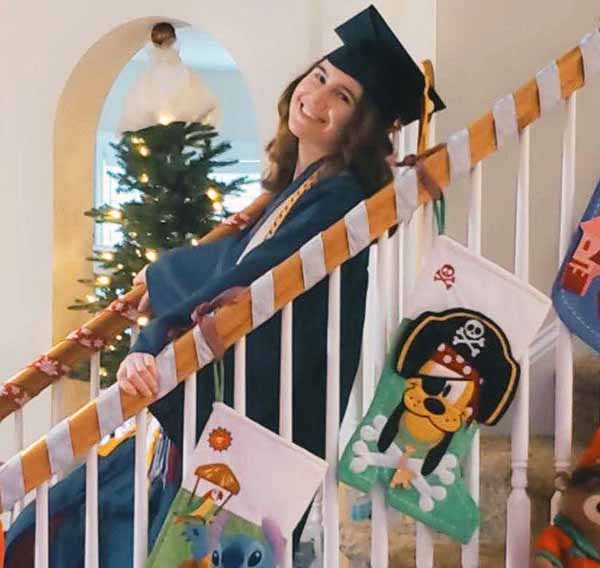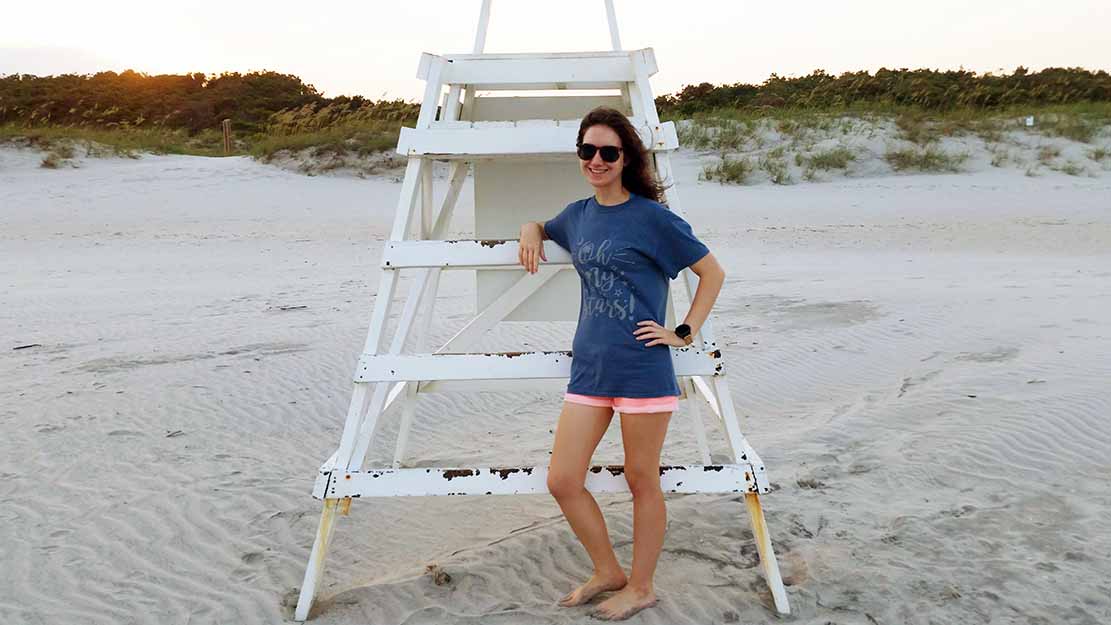Kaitlyn’s eyes don’t work quite right. They track independently of each other, which means she sometimes sees things as blurred or doubled.
Though it’s likely Kaitlyn was born with the condition, she was 12 before she received a diagnosis: convergence insufficiency.
Although Kaitlyn’s mom, Shari, knew that Kaitlyn had vision problems, she was shocked to find out that her daughter’s disability can pose a major impediment to learning. Having been homeschooled since 2nd grade, Kaitlyn had always excelled as a student.
Academics wasn’t Kaitlyn’s only strength. Her early aptitude for music began with piano in elementary school and quickly progressed to another instrument that occupied a prominent place in her church: the organ.
“When I was finally old enough to reach the pedals,” recalled Kaitlyn, “I asked the choir master if I could learn to play.”
Kaitlyn’s accomplishments soon earned her invitations to play at other churches. Her proficiency on the organ, which requires fingering multiple keyboards (technically, “manuals”) while reading complex musical notation, flummoxed healthcare professionals.
According to her doctors, said Shari, “she should not be able to track sheet music, but she’s been playing multiple instruments for years. It’s truly a God-given thing.”
Learning Together
Shari credits homeschooling with helping Kaitlyn cope with her ocular issues.
From the start, the family’s homeschool program entailed flexibility, multiple sources of instruction, and lots of family participation. As a result, it was easy for Kaitlyn to get more time to finish assignment when she needed it, and allowed her to try different study techniques in a relatively stress-free setting.

Photos courtesy of the family
Kaitlyn snaps a self-portrait on a cool afternoon.
Shari, who holds an advanced degree in communications, taught English to Kaitlyn and her younger brother Kyle. Shari’s father, who happened to be a retired science professor, pitched in with classes in calculus, chemistry, and physics. “We definitely had quite a few hands-on experiments!” Kaitlyn recalled with a smile.
With Shari’s job involving a good deal of travel, her business trips became family affairs—giving Kaitlyn and her siblings the chance to learn while out and about.
“We all went,” said Shari. “So my kids had the ability to experience a lot of areas of the country and meet different people. They made friends from all over the world.”
To better accommodate such extensive traveling, the family opted to homeschool year-round.
“We chose a ‘never stop schooling’ methodology that allowed me to teach when I could teach,” Shari explained.
Overcoming Again
About the time Kaitlyn was finishing middle school, however, she encountered new challenges.
The teen developed symptoms that wouldn’t go away: headaches, body aches, nausea, and fatigue. Sometimes, she blacked out.

Kaitlyn celebrates graduation.
Kaitlyn was finally diagnosed with postural orthostatic tachycardia syndrome (POTS), a nervous system disorder. For individuals with POTS, a change in position from sitting to standing can trigger a surge in heart rate and fluctuating blood pressure.
“It definitely affects all areas of your body,” Kaitlyn explained. “It feels like you have the flu, except all the time.”
Alongside her vision troubles, the new health issues meant Kaitlyn entered high school having to reevaluate her capabilities and what learning methods would enable her to complete her secondary education.
Flexibility proved the key—which, again, homeschooling provided.
Kaitlyn was able to set her own deadlines and pursued subjects in what Shari calls an eclectic fashion, focusing on topics of particular interest.
Homeschooling allowed her to continue succeeding academically and to even handle some extracurriculars. Among her many accomplishments, she acted as a local ambassador for the National Society of High School Scholars, performed in piano competitions, churches, and nursing homes, served as homeschool student council president, and helped arrange co-op and club activities.
Taking Creative Solutions to a New Level
The next difficulty came in finding a college that would accommodate Kaitlyn’s health needs. She ended up attending Liberty University.
“They gave me exactly what I needed,” said Kaitlyn.
The university assigned an advocate who assisted Kaitlyn during her entire tenure. Individual professors proved flexible as well, allowing her extra time for tests and quizzes, and options for using digital versions of textbooks.

A break from studies allows Kaitlyn and her family a chance to enjoy a day at the beach.
Even so, there were times when Kaitlyn had to plead for further dispensations. One time, her vision problems led her to bubble in a test answer she knew was incorrect (she was trying to determine which answer bubbles were real and which ones were duplicates created by her vision challenges). On days when her eyesight was extremely challenging, Kaitlyn had to enlist the assistance of her family to read aloud, scribe, and even proofread her work.
Right Time and Place
Kaitlyn’s senior year at Liberty brought an opportunity to give back to the homeschooling community at a crucial moment. She was able to fulfill internship requirements by volunteering as a homeschool consultant at Lowcountry Homeschool Association, which helps families in the area of South Carolina where her family lives.
“My timing could not have been better,” Kaitlyn recalled.
Her work occurred during the height of the COVID-19 pandemic, when schools across the United States were closing and an unprecedented number of families were turned to home education.
During her 16 weeks as a consultant, Kaitlyn said she spent six hours a day fielding “back-to-back calls from frantic parents asking, ‘What am I going to do?’”
Based on her own experience, Kaitlyn offered both encouragement and practical advice.
“I was able to explain that they’re not going to fail their kids,” she said.
But Kaitlyn did much more than that. Drawing from her college training in psychology and successes as a student overcoming special needs, she compiled a digital presentation on homeschooling basics for parents. It covered homeschool laws, top curriculum picks, learning styles, and how to start building an education program tailored to individual students.
The association then started taking appointments to have Kaitlyn make group presentations, both in-person and online.
“We were overwhelmed,” Kaitlyn recalled. “We had to book meetings a week in advance.”
Coming Home to Homeschooling
Her presentation was considered such an asset that association leaders asked her to leave the resource on their website, where it is still available.
And, after finishing her internship, said Kaitlyn, “I was asked to stay on.”
Though she’s still a volunteer, Kaitlyn now holds the title of deputy director for the association. She also works as a private homeschool consultant for families across the country.
But she hasn’t stopped learning! After graduating with honors from Liberty, Kaitlyn went on to earn a master’s degree in psychology from Capella University, and is now pursuing her doctorate there.
She hopes to conduct research on chronic illness and inclusivity in education, particularly in how homeschooling can benefit students with their health.
Ultimately, said Kaitlyn, she wants kids who struggle “to feel they can achieve their goals”—something she already knows a thing or two about.

